Former Trump Officials Warn About Iran Influence In US
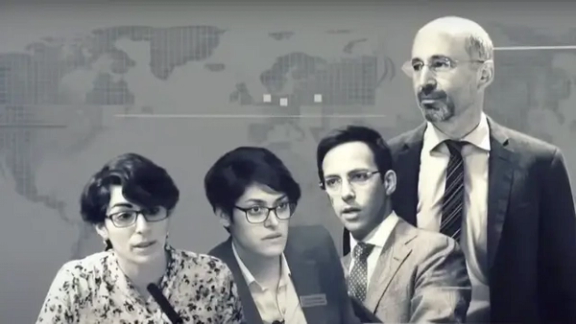
Former top US national security officials are asking the government to revoke security clearances for officials with “ties or sympathy for” the Iranian regime.

Former top US national security officials are asking the government to revoke security clearances for officials with “ties or sympathy for” the Iranian regime.
Semafor reported on Wednesday that senior Trump administration officials signed a statement saying, “As former senior officials in the United States Government we are very alarmed by the information contained in recent articles regarding Iranian influence operations targeting American citizens, especially US Government employees.”
Among the former officials are Secretary of State Mike Pompeo, National Security Advisor Robert O’Brien, Pentagon chief Christopher Miller, and Director of National Intelligence John Ratcliff.
The concern over potential security issues for the US government emerged when in September Iran International published a report based on a joint investigation with Semafor showing that several individuals close to, or part of the Obama and Biden administrations were acting as members of an Iranian government influence network in the United States.
“We are jointly speaking out in this unprecedented manner because of the clear and present danger Iran and its covert operations of many types, including its influence operations, pose to U.S. National Security,” the statement said.
The disclosure of an Iranian influence network has reverberated in the US Congress where many lawmakers have demanded answers from the Biden administration. In April, the security clearance of President Joe Biden’s Iran envoy Robert Malley was suspended, and he left the State Department, without being formally ousted from his position. Malley is under investigation for alleged mishandling of classified material.
Biden’s Iran policy has come under increasing scrutiny as his administration has failed to rigorously enforce US sanctions and in August agreed to release $6 billion of frozen Iranian funds.
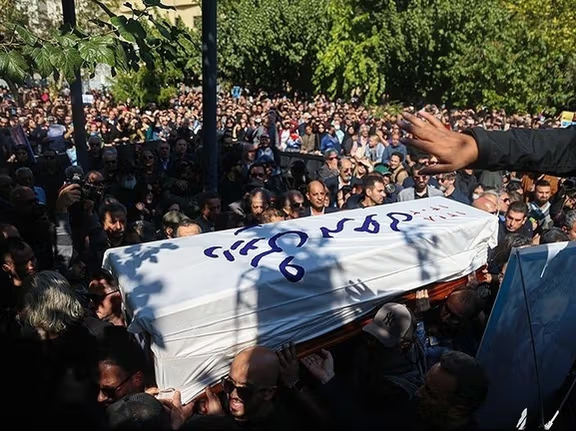
Attendees at the funeral of Dariush Mehrjui and his wife, who are suspected victims of a state-sponsored crime, chanted anti-government slogans in Tehran on Wednesday.
“Death to Khamenei”, and “Death to the perpetrator of this crime!”, chanted participants. Videos posted on social media also show many women not wearing the compulsory hijab and people chanting “Woman, Life, Freedom”, the signature slogan of last year’s nationwide anti-government protests.
Many Iranians believe the ruthless stabbing of the renowned filmmaker and his wife Vahideh Mohammadifar at their country home in Karaj Saturday evening strongly suggests state-sponsored murders similar to the chain murders of intellectuals in the late 1990s for which intelligence ministry agents were eventually found responsible.
Asked by reporters after a cabinet meeting Wednesday, Interior Minister Ahmad Vahidi accused the opposition of making these allegations to “instill insecurity in the society.”
Several of Mehrjui’s cinema colleagues and his daughter delivered brief speeches at the funeral ceremony outside Roudaki (Vahdat) Hall, a performing arts complex in central Tehran, attended by hundreds of artists and others.
“I feel like mom and dad are holding my shoulders and telling me to stand strong. As daddy said, murderers are really among us,” Mona, the couple’s young daughter who had defiantly attended the ceremony without headscarf, told the mourners.

Mona was referring to a short video of her parents speaking in a dark room in a hushed, dramatic tone. “Long live freedom!” her mother says in the video clip and her father picks up from there. “Long live Freedom! Murderers are among us… We must be vigilant!” It is not clear in what context and when the scene was filmed.
The revered eighty-three-year-old director refrained from engaging in politics for many years. However, over the past year, he subtly expressed support for the ongoing Woman, Life, Freedom anti-regime movement. This support is speculated to be a possible reason for him being targeted by the state, according to some allegations.
Participants also expressed their disapproval by booing writer and actor Marzieh Boroumand who leads Khaneh Cinema, the largest association of filmmakers and actors in Iran, of which Mehrjui was also a member. This disapproval came during her speech when she referred to Israel as the Zionist regime.
Addressing the authorities, Boroumand said cinema people would fight alongside them with “Israel, the Zionist regime” if they were treated better.
Tehran’s support for Hamas and other militant organizations in the Middle East has led many Iranians to adopt a contrasting stance, favoring Israel in its military actions and condemning Hamas as the party that started the recent war in Gaza.
Police has so far twice refuted news of arrests reported by the media. Photos of the murder scene published by the media show grave negligence in securing the crime scene including by police officials who are seen walking around and giving interviews in the rooms where the murders took place without taking any precautions not to contaminate the scene.
The details of the fatal stabbing of Mehrjui and his wife evoke the state murders of dissident politician Dariush Forouhar and his wife Parvaneh Eskandari in November 1998 for many Iranians.
Naser Zarafshan who represented the families of some of the victims of the notorious chain murders in late 90s, including the Forouhars, has also highlighted that the similarities between the two double murders are striking. Those responsible for these murders sought leaving a striking mark rather than just killing a person, Zarafshan said while expressing concern over a cover up.
In a commentary published by the reformist Etemad newspaper on Tuesday, another prominent lawyer, Kambiz Nowrouzi argued that the manner of the killings which he said were very “theatrical,” and the fact that not much seems to have been stolen from the house, strongly suggest that the couple were killed to “terrify others, or even the whole society”.
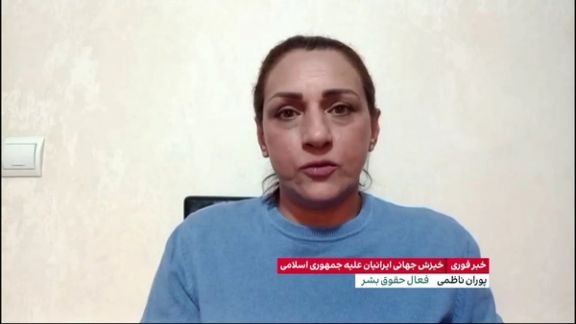
The Iranian judiciary has leveled serious charges against a group of civil and human rights activists.
Dadban, a collective of pro-bono lawyers in Iran defending political prisoners and human rights advocates, reported that the Judiciary of the Islamic Republic has accused several individuals of "Moharebeh," or war against God, and "Corruption on Earth," offenses that could potentially lead to the death penalty.
According to the disclosed information, the Islamic Revolutionary Court of Jiroft, a city located in the southern Kerman province, has initiated legal proceedings against at least four civil and human rights activists.
Among them is Puran Nazemi, a writer, poet, political activist, and human rights advocate. Nazemi, who has experienced multiple arrests and imprisonments over the past four decades, was detained twice during the anti-regime protests last year.
In late October 2021, intelligence agents conducted a raid on Nazemi's residence, subsequently transferring her to Evin Prison and placing her in solitary confinement. Although she was released two months later, she was re-arrested in February while visiting her father at a hospital and was then relocated to an undisclosed detention facility.
Dadban, relying on documentation acquired from an inside source within the Kerman Judiciary, has exposed that Nazemi and three other activists are also accused of endangering national security, inciting the public to commit acts against domestic security, insulting authorities and officials, and propagating against the Islamic Republic, among other allegations.
The identities of the other accused individuals have not been revealed. Throughout the Iranian uprisings against the Islamic Republic, around 22,000 citizens were detained, with many facing serious charges. To date, seven protesters have been executed.
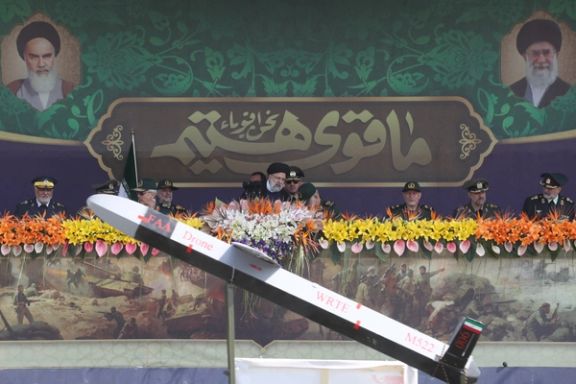
The UN sanctions on Iran’s missile program expired Wednesday, a victory for Tehran and raising concerns about the accelerated proliferation of its dangerous weapons.
The Iranian ministries of foreign affairs and defense issued separate statements announcing the end of UN prohibitions aimed at constraining Iran's missile and drone activities under Security Council Resolution (UNSCR) 2231, which endorsed the now defunct 2015 nuclear deal. The Islamic Republic is now free to sell its drones, ballistic missiles, and related long-range strike technologies to its anti-Western partners and clients and buy technology to develop more.
The lapsed prohibitions in UNSCR 2231 included sanctions on key individuals and entities connected to Iran's nuclear and military infrastructures. Annex B of the resolution prohibited activities such as development, tests, military employment, and others.
The three European parties of the Joint Comprehensive Plan of Action (JCPOA), the so-called E3, announced in September that they would keep their sanctions in place. However, the United States and E3 have not taken action to snap back UN sanctions or extend the UN's missile sanctions. A full snapback of sanctions would require a letter sent to the UN Security Council, informing it of Iran's noncompliance with UNSCR 2231.
The US on Wednesday tried to limit Iran's missile and drone programs by imposing new sanctions, warning companies how to avoid selling Iran sensitive technology and dusting off a 20-year-old program to stop weapons of mass destruction shipments, called the Proliferation Security Initiative (PSI).
The US Treasury said it imposed sanctions on 11 individuals, eight entities and one vessel based in Iran, Hong Kong, China and Venezuela that enable Iran's "destabilizing" ballistic missile and drone programs.
The US government also issued an "Iran ballistic missile procurement advisory" to industry laying out what it said were the deceptive practices that Iran uses to obtain parts for its ballistic missile program from around the world.
In a joint statement, more than 45 states, including the US and close allies in Europe and Asia, committed to uphold the 2003 PSI designed to stop shipments related to weapons of mass destruction.
"The sanctions relief "was based on the assumption that Iran would take the necessary steps towards restoring confidence in the exclusively peaceful nature of its nuclear program. This has not happened," the joint statement said.
In a separate statement, US Secretary of State Antony Blinken said, “We see the horrific impact of Iran’s provision of missiles and unmanned aerial vehicles (UAVs) to designated terrorist organizations and militant proxies that directly threaten the security of Israel and our Gulf partners.”
"We see the destructive result of Iran’s transfer of lethal UAVs to Russia to target critical civilian infrastructure and kill civilians in Ukraine," he added, saying Washington would use "every tool at our disposal" to counter Iran’s development, procurement and proliferation of missiles and drones.
EU countries cite several reasons for keeping the sanctions: Russia's use of Iranian drones against Ukraine, the potential transfer of ballistic missiles from Iran to Russia, and Iran's violation of the nuclear deal, which has deprived Tehran of its benefits. However, they are unwilling to pursue a snapback. Snapback is a process that would result in the restoration of six UNSCRs on Iran from 2006 to 2010, along with the reinstatement of all their associated prohibitions and penalties. These measures were agreed upon in the JCPOA to ensure that Iran recognized the consequences of any non-compliance, consequences that cannot be thwarted by Russia and China, Iran's Security Council allies with veto power.
“Lapsing UN penalties on Iran’s ballistic missile tests, transfers, and other activities will be yet another sign of the international community’s irresolution to say and do the right thing on Iran. It will, therefore, embolden Iran to double down on its terror proxies and arms proliferation. The more confident Tehran feels, the more lethal the threat,” said Behnam Ben Taleblu, a senior fellow at US-based think-tank the Foundation for Defense of Democracies (FDD).
Additionally, sanctions by the E3 only restrict Iran’s missile trade with the European countries and do not extend to third parties. It practically means Iran can legally trade weaponry with Russia for the invasion of Ukraine.
On Tuesday, Russia said it need no longer obey UN Security Council restrictions on giving missile technology to its ally Iran once they expire, without explaining if it plans to support Tehran's missile development.
"Supplies to and from Iran of products falling under the Missile Technology Control Regime no longer require prior approval by the UN Security Council," Russia's foreign ministry said. Russia has grown close to Iran since invading Ukraine in February 2022 and would likely use the easier flow of missiles to facilitate its invasion. Many of the hundreds of one-way attack drones it has used to bomb Ukraine in the last year were Iranian made.
Russia urged both the EU and the US to drop their sanctions, which it said were "an effort to settle political scores with Tehran" and had no implications for "other countries that treat international law and their obligations with due respect".
Iran’s Foreign Ministry said, “According to the provisions of 2231 UNSC Resolution, termination of these restrictions, does not require any resolution, statement or any other action in the context of the UNSC and occurred automatically."
As a result of the sanctions expiration, Iran’s can make money from missile sales and then use the profits to finance its militant and terror proxies in the Middle East.

MI5, the UK’s security service, has stated that amid the war between Iran-backed Hamas and Israel, Iran may be exploring new ways to threaten the security of Britain.
Speaking at a security summit in the US, Ken McCallum, the Director-General of MI5, referred to "hostile activity by the Islamic Republic in the UK," emphasizing that countering threats from Tehran remains a top priority.
"Iran has been a rising source of concern and a rising source of task for MI5 over the last 18 months or so in particular," he said.
McCallum's comments come in the context of heightened security concerns related to Iran. Last year, Iran International temporarily relocated its television broadcast from London to Washington, DC, due to terrorist threats. The decision to cease Iran International's activities in the British capital was made after the arrest of an Austrian national named Mohammad-Hussein Dovtaev on February 13. He was detained while filming outside the network's premises.
Security agencies, especially after the outbreak of the uprising against the Islamic Republic in September 2022, have increased concerns about threats against Iran International due to its coverage of popular protests.
Iran International resumed broadcasting from its new London studio on September 25.
The Director-General of MI5 refrained from responding to questions about Iran's role in Hamas attacks on Israel.
Senior officials in Western countries have criticized the continuous support of the Islamic Republic for Hamas, but they have stated that they have not found direct evidence of Tehran's involvement in Hamas's invasion of Israel on October 7.
Iranian authorities have repeatedly denied their involvement in Hamas' attacks on Israel.
So far, thousands of people have been killed, wounded, and displaced in the ongoing conflict between Israel and Hamas.
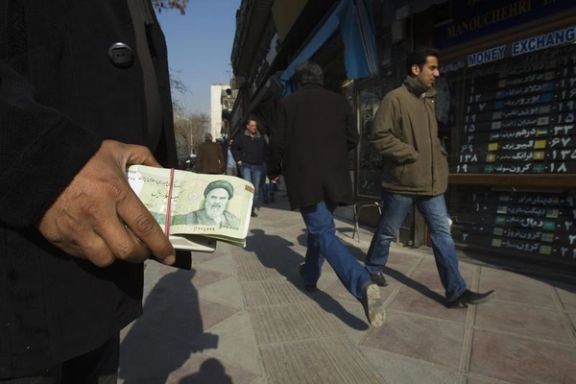
Amid Iran’s claim of stronger economic resilience thanks to higher foreign currency reserves, there are increasing calls for more effective enforcement of US sanctions.
The deputy chief of the Central Bank of Iran, Mohamamd Shirijian, said Tuesday that Iran's foreign reserves are increasing due to the growth of oil and non-oil exports.
He claimed that despite global economic shocks, Iran's GDP grew by 4% in 2022, and the growth rate in Q1 and Q2 of 2023 increased 5.3 and 6.2 percent, respectively.
The claims seem in contradiction to a report by reformist daily Ham-Mihan earlier in the day that forecasted a budget deficit twice as big as the figure in the previous year. The paper said if the country’s revenues in the second half of Iranian year (which ends in March 2024) mirror the trend in the first six months, the budget deficit would significantly worsen in comparison with last year.
It is very difficult to judge the veracity of the Central Bank's optimistic claim, given the lack of any positive movement in Iran's currency markets or the nearly 50-percent annual inflation rate. The current government dominated by hardliners is notorious with making outlandish claims of economic success.
One fact is clear; Iran is exporting much more oil than at any time since early 2018, before the United States withdrew from the JCPOA nuclear deal and imposed tough sanctions on Tehran's oil exports and international banking operations.
Under Trump’s maximum pressure, Iran’s oil exports were down to less than 500,000 barrels per day. Now the figure is reportedly nearly two million barrels. Iran regularly boasts about the rise in its oil exports, but the rise has not translated into tangible changes in the country’s economy.
The national currency rial has lost its value 12-fold since early 2018, when the United States withdrew from the JCPOA and imposed 'maximum pressure' sanctions. This has made imports much more expensive and has led to very high inflation at around 50 percent for the past three years. In recent weeks, the rial lost its value even further to stand at about 520,000 against the dollar over the crisis in Israel and talks of refreezing $6 billion recently released from South Korea under a prisoner swap deal with the US.
In a letter published Monday night, 63 Democrat and 50 Republican US lawmakers called on President Joe Biden to ensure maximum enforcement of all US sanctions and taking any and all steps to end Iran’s oil trade with China, which currently brings in well over $100 million per day in revenue.
In a separate initiative Tuesday, a group of Senate Republicans demanded once more that the administration refreeze the $6 billion parked at Qatari banks as part of a deal to free five hostages from Tehran.
“We know that Iran bankrolls Hamas,” said Senator Balckburn, leading the group. “It is perplexing why this administration refuses to issue a formal decision to freeze the $6 billion. We need to ensure that not another dollar goes to Iran.”
Senator George Marshall, one of the more vocal members of the Senatorial group who demanded the ‘refreeze’ on Tuesday, claimed that under Biden, Iran's currency reserves have gone “from $6 billion to $60 billion” because the regime has been allowed to sell “a billion dollars’ worth of oil every week to China.”